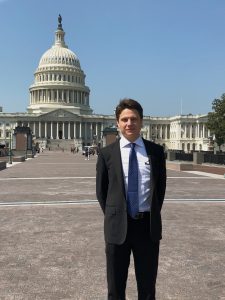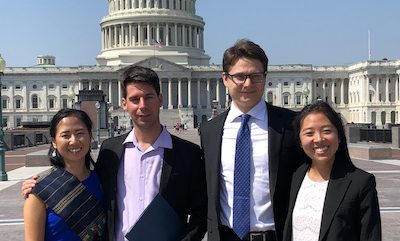
Wanting to be a voice for seismology on Capitol Hill, Dimitri Voytan knew he needed to improve his science communication skills. He looked to the SSA Geosciences Congressional Visits Day (Geo-CVD) travel grant program for the training he needed.
The Geo-CVD gathers geoscience researchers, students and educators in Washington, D.C. to raise visibility and support for the geosciences. The summer of 2019, before Voytan began his doctoral program at the University of Texas, Austin, he traveled to the Capitol to participate.
“I could draw a connection between the work I had done and the work I was doing to societally relevant issues,” explains Voytan, who relies on congressional funding for his research to identify tsunami hazards. “I wanted to learn how folks communicate their science with Members of Congress.”
Voytan met with the offices of Senator Kamala Harris (D-CA) and Senator Diane Feinstein (D-CA) to discuss the Digital Coast Act, legislation that would update NOAA’s Digital Coast Program and provide coastal communities with geospatial datasets to improve coast management. At the time, Voytan had been working on a project related to tsunami hazards. Drawing from this research, he used his personal connections to advocate for reducing coastal hazards and improving management.

Voytan says he relied on advice he received for communicating with legislators: “Devise a creative way to connect your message to your district’s goals and to the specific legislation that the member of Congress is trying to promote.”
For example, when advocating for the Digital Coast Act at the office of Arizona Representative Greg Stanton (D-AZ), Voytan had to get creative. He knew that Stanton served on the U.S. House Committee on Transportation and Infrastructure, so Voytan explained how the Digital Coast Act would impact issues related to infrastructure and transportation. He says he strived to craft his message in a way that was easily understood and “not too technically difficult.”
Voytan considers the Geo-CVD a unique opportunity for SSA student members to improve their communication and advocacy skills.
“Ph.D. programs focus on research, which is important, but only part of a scientist’s responsibility,” says Voytan. “Another part of that responsibility is communicating with the public and securing funding.”
While the Geo-CVD program is on hiatus this year due to COVID-19, the Society plans to participate again in 2021. The Geo-CVD Travel Grant is funded through member contributions. If you would like to help students like Dimitri continue advocating for seismology, you can do so here
Geo-CVD is an annual activity of SSA’s government relations program, through which the Society advocates for seismology on Capitol Hill. SSA’s new Seismology Matters brochure reminds policymakers of the powerful role they play in advancing earthquake science and protecting public safety. View it online now.
For more information about SSA’s policy program, please contact policy@seismosoc.org.
